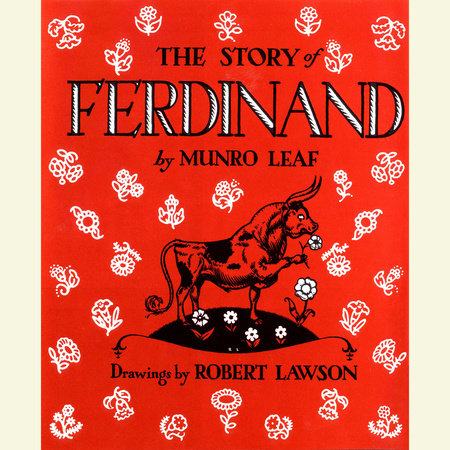We’ve talked about historical context, we’ve talked about animal rights, and now it’s time to talk about why boys can’t cry. More importantly, it’s time to talk about being true to yourself. Our protagonist, Ferdinand or Ferd, has no problems breaking societal norms—animal norms?—when he chooses smelling flowers over fighting in the ring. Being different causes Ferd a lot of problems, and those problems are rooted mainly in toxic masculinity.
Short and sweet to the point, toxic masculinity is the driving force behind the idea that boys shouldn’t cry. It’s the idea that boys and men should strive to be alpha-males, and there’s no bigger alpha-male in the 2017 Ferdinand film than his childhood rival, Valiente. Valiente is strong, proud, and let’s be honest, a little bit of a jerk. As a child, he torments Ferdinand for being different, and he gleefully stomps on Ferd’s precious flowers. However, when Ferdinand’s father fails to return from the fight with the matador in Madrid, it’s obvious that Valiente is sympathetic. In fact, he’s inches away from offering comfort until his own father steps in claiming that only the weak fail. The moment is gone and Valiente vows to be stronger than anyone else, even the matador.
Fast forward a couple of years. Ferdinand is somehow back at Casa del Toro and he is not happy about it. After all, he’s face to face with his old bully and Valiente is worse than ever. He’s just as bad, if not worse, than his father was. Unlike last time, Valiente is now being driven by a certain type of desperation—it’s finally his time to shine and Ferdinand, a gentle giant, is here to take everything from him. All of Ferd’s reassurances that this isn’t what he wants, all of Ferd’s warnings about the truth behind bullfighting, everything, falls on deaf ears for Valiente. He is so concerned with boosting his ego and fueling his pride that when one of his horns breaks, he views himself as useless. The depression Valiente falls into is so deep that he willingly goes to the chop-shop Guapo had been taken to halfway through the film. If he can’t be a strong bull, then he’s nothing, and he’s better off dead.
That’s definitely one of the side effects toxic masculinity can have. Valiente’s means of expressing himself—angrily and through his horns—has been taken away and he’s supposedly left with nothing else. Of course, that’s what Ferdinand intends to change. Not once does he give up in trying to help Valiente. In the end, he convinces Valiente that it’s not manly at all to give up, and that Valiente needs to find himself again. He needs a new way to be himself. Ferd may be a pacifist but he’s quite bull-headed!
Like Ferdinand and Valiente, the other bulls, Guapo, Bones, Machina, and Angus also learn to accept who they are, and be themselves. Despite the peer pressure they place upon themselves, and the fear of failure they all possess, they are able to look beyond the bullfighting ring and see what lays ahead for them, if only they can accept themselves.
In the movie Ferdinand there is a scene where Ferd finally gets so fed up with the taunting that the European purebred horses next-door—read, inbred—are giving him and the other bulls that he challenges them to what they thought they did best: dancing. Ferd, ever the lover, the flower sniffer, the dancer, and never the fighter, has some impressive moves, and he battles it out with the three horses. Seeing Ferd stand up to those barnyard bullies is the push that Angus needs to stand up for himself as well, and he jumps in with Scottish step dancing to the bagpipes. Bones and eventually Machina follow suit, and together they show those horses that bulls can have rhythm too.
While they were still ways a way from deciding to leave Casa del Toro and the bullfighting ring behind, it was a step in the right direction toward accepting who and what they wanted to be. In the end, Ferdinand, just like in the book, leads by example and when it comes time for him to fight in the ring with the matador, he refuses. The matador chases him all around the ring, the picadors poke him with spears, the crowd eggs him on, but he refuses to fight back, even when the matador grows enraged and draws his sword on Ferdinand and cuts him. Ferdinand becomes angry in his pain, and chases the matador, but stops when something small and red catches his attention at his feet. It’s a pretty flower—a little red rose. He comes back to himself, sits down, ignores the matador, and sniffs the flower. The crowd goes wild over this gentle bull; in the end, the matador spares his life, and Ferdinand is able to return to his home with his family and new friends who love him.
At the end of the day, it is his self-acceptance of who he is, of staying true to himself, that wins the crowd and the matador over, and saves his life that day in the ring. He and the other bulls, who give up on the fighting they never wanted, happily embrace a life of peace, live happily ever after on that green meadow, beneath the Cork tree, surrounded by flowers.
PRR Writers, Sierra Jackson and Cheyenne Lopex
